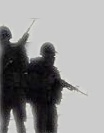 |






 AfricaSpeaks Weblog AfricaSpeaks Weblog
 Rootswomen Weblog Rootswomen Weblog
 Rootsie's Weblog Rootsie's Weblog
|
Can US and UK Avoid a Battle of Berlin?
Posted: Thursday, March 27, 2003
Christopher Bellamy, The Independent via aljazeerah.info
As US forces edged closer to Baghdad on Tuesday, their advance slowed by a sandstorm, the armored battle in the open that would have suited US commanders failed to materialize. No surprise there. The Iraqi forces protecting the capital — the "elite" Republican Guard divisions (although such terms are relative) — appeared to be digging in, to wait for the Americans to come to them. It is a sound strategy. The Americans are either going to have to attack Iraq's best regular soldiers in defensive positions, or halt short of the city.
The British and US plan is to encircle and cut off the city before launching any assault in the urban area. Sooner or later they may have to mix it with Iraqi infantry in the streets. As an experienced commander said on Tuesday, there is a "density problem". In other words, not enough allied troops. Cities with millions of people absorb soldiers like sponges with millions of holes. The allies had hoped to avoid a Battle of Berlin in Baghdad. Although the Republican Guard largely escaped from the Kuwait theater of operations in 1991, the mauling that their less well trained, equipped and supplied Iraqi Army colleagues suffered at the hands of British and American forces will not have been lost on them.
Forward defense, primarily west and south of Baghdad, is therefore an unlikely option. Instead, it looks as if the Iraqis will use a strategy of urban warfare in and around all their cities, towns and villages. This negates the technological advantages of the British, American and Australian troops.
Three of the six Republican Guard divisions — the three armored ones of 10,000 to 12,000 men each — are in the Baghdad area. While Iraqi Army units are all reported to be at 50 percent strength and lacking spares for half their vehicles, the Republican Guard are at more like 80 percent strength. The Medina division, which was to the west and has, we are told, been attacked by US helicopters, is moving to the south. The others, to the south and east, are the Baghdad and Al-Nida divisions.
Unlike in 1991, the Republican Guard will not avoid conflict. British and US commanders believe that if the overthrow of Saddam Hussein's regime is imminent, the Republican Guard's only option is to fight. But that argument applies to tens of thousands of people in Iraq, and is not good news for the invaders.
Behind the Republican Guard are four brigades of the Special Republican Guard — 20,000 to 25,000 troops — who are either inside Baghdad or in President Saddam's home area of Tikrit. They are likely to be the last element to give up the fight.
There was some positive news for allied commanders on Tuesday. Umm Qasr, the deep-water port necessary for reinforcement and humanitarian aid, was declared "safe and open". But Basra was declared a "military objective". At first, the British and US troops operating on the right flank had hoped its population would welcome them. When they did not, the British and US command decided to isolate it. Six days into the war, Iraq's second city has to be opened up.
Iraq's 51st Division, whose apparent surrender was greeted with enthusiasm a few days back, appears to have yielded few prisoners. The division left its heavy equipment and melted into the urban landscape of Basra. Even if, as reported, there are only 1,000 loyal Iraqi regulars in Basra, that is bad news for the three British brigades (3 Commando, 7 Armored and 16 Air Assault).
The good news is that allied units are unlikely to be surprised by large-scale armored counterattacks. The "battlespace" should be "transparent": There should be "total battlespace dominance". But a couple of snipers in the upper floors of a building will stop you having dominance.
Estimates of the number of Iraqi prisoners have been revised downward to a couple of thousand. According to the International Institute for Strategic Studies, Iraq's armed forces numbered about 375,000 before the start of the war. Even with the most inflated estimate of Iraqi dead and prisoners, that still leaves about 370,000. This is not going to be a short war.
(Christopher Bellamy is professor of military science and doctrine at Cranfield University.)
 Printer friendly version Printer friendly version
 Send page by E-Mail Send page by E-Mail
|








